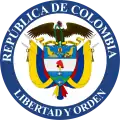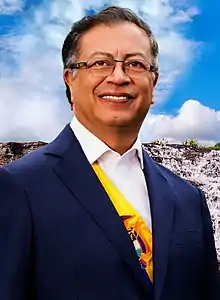President of Colombia
The president of Colombia (Spanish: Presidente de Colombia), officially known as the president of the Republic of Colombia (Spanish: Presidente de la República de Colombia) or president of the nation (Spanish: Presidente de la Nacion) is the head of state and head of government of Colombia. The office of president was established upon the ratification of the Constitution of 1819, by the Congress of Angostura, convened in December 1819, when Colombia was the "Gran Colombia". The first president, General Simón Bolívar,[2] took office in 1819. His position, initially self-proclaimed, was subsequently ratified by Congress.
| President of the Republic of Colombia | |
|---|---|
| Presidente de la República de Colombia | |
 Seal of the President | |
 Presidential flag | |
 Gustavo Petro since 7 August 2022 | |
| Executive Branch of Colombia Administrative Department of the Nation | |
| Style | Mr. President (informal) The Honorable (formal) Mr. President of the Nation (within the Senate) His Excellency (diplomatic) |
| Type | Head of state Head of government |
| Abbreviation | President of the Nation |
| Member of | Cabinet National Government Council of Ministers of Colombia National Economic Council |
| Residence | House of Nariño |
| Seat | Bogotá, D.C. |
| Appointer | Popular vote |
| Term length | Four years, non renewable |
| Constituting instrument | Constitution of Colombia |
| Formation | 17 December 1819 |
| First holder | Simón Bolívar |
| Deputy | Vice President of Colombia |
| Salary | COP$32,624,000 monthly[1] |
| Website | Presidencia de la República |
| This article is part of a series on the |
| Politics of Colombia |
|---|
 |
|
The current president of the Republic of Colombia is Gustavo Petro, who took office on 7 August 2022.
Functions
According to the Colombian Constitution of 1991, Article 188, the president of Colombia is the head of state, head of government and Supreme Administrative Authority. The president of Colombia symbolizes the National Unity, and after taking an oath to the Constitution of Colombia and swearing to defend and protect the nation's laws, he is charged to guarantee and protect the rights and liberties of all Colombian nationals.[3]
The Administrative Department of the Presidency of Colombia has the commission to assist or support the president of Colombia on its constitutional mandated functions and legal issues.[3]
Article 115 states that the National Government is formed by the president of Colombia, the vice president of Colombia, the Council of Ministers of the Republic of Colombia and the Directors of the Administrative Departments of Colombia. Any official from these entities constitute the Government of Colombia in any particular business.
Any act by the president of Colombia, in order to be legal and enforceable, must be sanctioned by any of the ministries or department directors, who will also be held responsible for the act. The only exception is if the president appoints or removes ministers, administrative departments' directors and any other officials appointed by him under his administrative authority. Governors of the Departments of Colombia, mayors of Municipalities of Colombia, as well as regional superintendents of Colombia, public establishments and industrial and commercial state owned enterprises, are all part of the executive branch of Colombia.
General description
The Colombian Constitution of 1991, coupled with several articles of amendment, establishes the requirements an eligible candidate must meet in order to become president, as well as the term of office, method of election, and powers.
Requirements for holding
Colombian Constitution of 1991 Article 191: states that the president must be a natural born citizen of Colombia and at least 30 years of age.[4]
Term of office and election
The president and vice president serve a term of office of four years after being elected by popular vote. Since 2015, the president is barred from running for reelection, even for a nonconsecutive term.[5]
From 1910 to 2005, the president was limited to a single term. However, on 24 November 2005, the Colombian Congress introduced the Electoral Guarantees Law (Ley de Garantias Electorales), which modified Article 152, of the Colombian Constitution of 1991 and allowed a president to run for a second term. The President or Vice President running for re-election was required to formally notify the National Electoral Council and guarantee a fair competition for the other contenders. Participation of acting officials in political proselytism was standardized. Presidents or vice presidents not running for office were barred from participating on political proselytism. If one or both were running, they could only engage in political activity four months before the primary elections. Also, if the president and/or vice president were running for office, they could participate in their political party's selection mechanism to postulate candidates. In 2010, the Constitutional Court of Colombia threw out a planned referendum to allow presidents to run for three consecutive terms. It ruled that Colombian presidents could only serve two terms, even if they are nonconsecutive.[6] In 2015, a constitutional amendment repealed the 2004 changes and reverted to the original one-term limit.[7]
Line of succession
Further succession
In absence of both the president and the vice president, Article 203 of the Constitution of 1991 establishes that the presidential office will be assumed by a minister in the order of precedence established by law. The assuming minister has to be a member of the same party or movement the original president belonged to, and will exercise the presidency until the Congress, within the 30 days following the presidential vacancy, elects a new vice president who will assume the presidency.
Living former presidents
As of 2 November 2022, there are six living former Colombian presidents:
- César Gaviria
(1990–1994)
(age 75) - Ernesto Samper
(1994–1998)
(age 72) - Andrés Pastrana
(1998–2002)
(age 68) - Álvaro Uribe
(2002–2010)
(age 70) - Juan Manuel Santos
(2010–2018)
(age 71) - Iván Duque
(2018–2022)
(age 46)
References
- "¿Sabe usted cuánto gana el presidente de Colombia?". El Universal. 30 May 2015.
- Gobernantes Colombianos, Ignacio Arismendi Posada, Interprint Editors Ltd., Italgraf, Segunda Edición, Page 15, Bogotá, Colombia, 1983
- "Departamento Administrativo de la Presidencia de la República : Nuestra Entidad" (in Spanish).
- "Requisitos para ser candidato presidencial" (in Spanish).
- L, Elizabeth Reyes (4 June 2015). "Colombian lawmakers approve a one-term limit for presidents". EL PAÍS English Edition.
- Buckman, Robert T. (2010). The World Today Series: Latin America 2010. Harpers Ferry, West Virginia: Stryker-Post Publications. ISBN 978-1-935264-12-5.
- "Constitución Política de 1991 (Artículo 197)". Secretaría General del Senado.